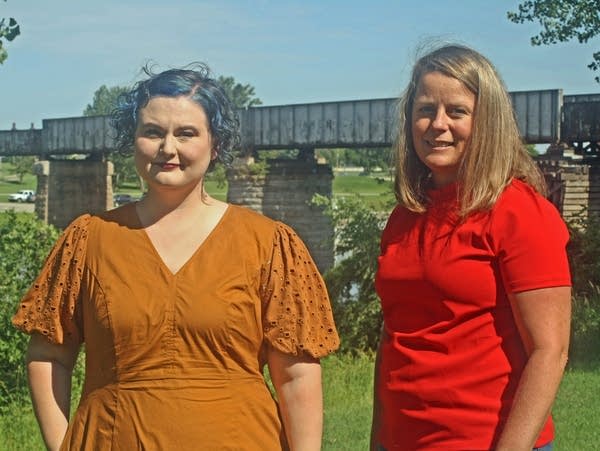In Grand Forks, giving dignity to a man denied justice
Remembering a North Dakota lynching

Go Deeper.
Create an account or log in to save stories.
Like this?
Thanks for liking this story! We have added it to a list of your favorite stories.
The crime is nearly 140 years old. The effort to redress the injustice, more than two decades in the making.
But this month, Grand Forks will finally raise a memorial to Charles Thurber, a Black man in his 30s, who was killed by a mob of white residents there in 1882.
Efforts to memorialize the man about whose life very little is still known — and whose death represents an ugly piece of the city’s story — have risen and quickly fallen since the late 1990s.
Thurber had been living near Grand Forks when he was accused of sexually assaulting — “outraging,” in the language of the time — two white women. He told a local reporter in an interview from his jail cell that he was innocent, and that he’d had a consensual relationship with one of the women.
Turn Up Your Support
MPR News helps you turn down the noise and build shared understanding. Turn up your support for this public resource and keep trusted journalism accessible to all.
While he waited to appear before a judge, a mob of white residents broke him out of the courthouse jail, dragged him several blocks through the streets and hung him from a railroad bridge over the Red River. According to breathless local newspaper reports, an estimated crowd of 2,000 watched and cheered. The newspaper said the entire city was responsible for Thurber’s death.
Audra Mehl had never heard of Charles Thurber when she started her first year of teaching English to sophomores at Grand Forks Central High School in 1996.
"I wanted very desperately to always make whatever I was teaching relevant to them," Mehl, who was 24 at the time, recalled.

As her class read “To Kill A Mockingbird,” the story of a young Black man on trial after being falsely accused of raping a white woman, she encouraged her students to find relevant examples of racism in their own city.
What they found was the story of Charles Thurber. Old newspaper articles reported his death in stark and gruesome detail.
"They were just very alarmed at what they read,” Mehl said. “It was descriptive. It was horrifying. It was celebratory. It was very vivid, there's a vivid description of his lynching.”
One headline said Thurber was "hung with hilarity and dispatch." The newspaper described his death in graphic terms, and reported that "the executioners on the bridge passed around a bottle and drank to his health,” while Thurber was dying.
The rope they used to kill Thurber was cut up. The pieces sold for 10 cents each. The paper reported that "they went like hotcakes."
According to the report, there was no investigation of the crime. Charles Thurber was buried in an unmarked grave.
Newspaper reports later indicated at least one of the women recanted her allegations against him.
After encountering Thurber’s story, Mehl said, “My students read ‘To Kill a Mockingbird’ very differently.” She remembers emotional classroom discussions about the Thurber case.
The class decided they should do something about the injustice — so they asked the mayor and the City Council to put up a memorial marker near the bridge where Thurber was killed.
City leaders agreed. But before a plaque could be installed, the historic flood of 1997 forced the entire city to evacuate. Hundreds of homes and businesses were flooded, several blocks of downtown businesses burned, and the lynching faded into the background as rebuilding consumed the community.
A year later, Mehl left Grand Forks, and soon left teaching.
In 2015, after Michael Brown was killed by a police officer in Ferguson, Mo., and the world erupted in calls for racial justice, there was a brief but unsuccessful attempt at resurrecting a memorial to Grand Forks’ own painful history.
Earlier this year, after George Floyd was killed by police in Minneapolis and those calls for justice erupted anew, Maura Ferguson felt the time was right to try again.
"I was up late one night watching live footage of the riots in Minneapolis, and my mind kind of drifted back to Charles Thurber and what happened here. And I thought, if there's ever a time to finish this, it's now," said Ferguson.

A city official agreed the project, which had been approved nearly a quarter-century earlier, could move forward — if she could raise $3,000.
"I said, ‘Just give me 24 hours, I can totally get that, no problem’ — joking — but we had more than $3,000 within about 22 hours,” said Ferguson. The local support for the effort has been “overwhelming,” she said.
Because the fundraising exceeded $3,000 and the GoFundMe account she built to accept donations keeps expanding, a fund has been established to provide scholarships to high school students engaged in anti-racism work.
“He will leave a legacy of understanding — hopefully of education and scholarship surrounding anti-racist work,” Ferguson said.
Later this month, a bronze plaque will be placed on the bank of the Red River near the railroad bridge where Thurber was killed in 1882, and a memorial service will be scheduled.
“Having a plaque and being able to memorialize this tragic event offers people a point of reflection,” said Grand Forks Historic Preservation Commission coordinator Susan Caraher.
“It is important for us to recognize that it happened here and we can make amends in this way.”

Little is known about Thurber. The newspaper reported that he was a blacksmith from a small town near Grand Forks. The people involved in raising money for the memorial tried unsuccessfully to find Thurber’s relatives. There’s no record of where Thurber is buried.
Ferguson has been singing professionally at funerals for 21 years. She couldn’t let go of the idea that no mourners attended Thurber’s burial in an unmarked grave, “knowing that Mr. Thurber died in such a horrible way, and that he was not eulogized, there was no sort of dignity afforded him,” she said.
While this month’s marker installation — which will also include a memorial service — will mark the end of the decadeslong effort to publicly remember this lynching, Ferguson said it really marks the beginning of needed anti-racism education in the community.
"It's important for us to not sanitize our past, because if we do that, we put ourselves at risk of a future that's not equitable and healthy for everybody," she said.
Audra Mehl, who now works for a software company in Fargo, was thrilled when she heard the project was finally going to happen.
"I felt like crying,” she said. “I had goosebumps, and I felt guilty that I hadn't been the one to do anything more about it."
Mehl plans to be at the memorial service for Charles Thurber. She thinks the message she tried to teach her students 24 years ago is perhaps more relevant now.
"We cannot give up our compassion for fellow human beings, we can't lose that, we cannot become desensitized to the stories of other people,” she said. “They're just like us and as soon as we start to think of people as not being like us at all that's where the danger is."


